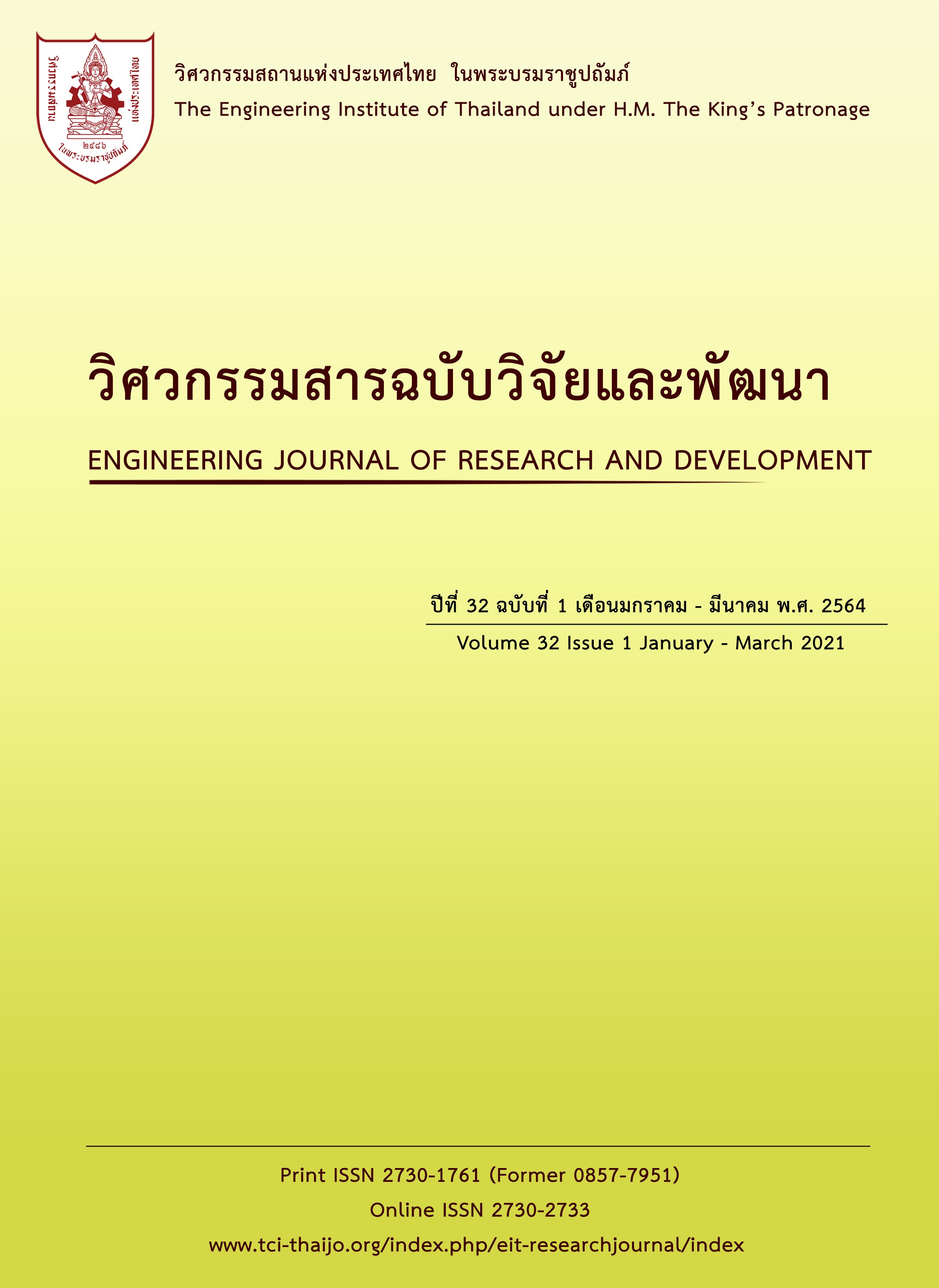THE FACTOR OF CONFLICT EFFECT TO GOVERNMENT CONSTRUCTION PROJECT
Main Article Content
Abstract
This research uses quantitative research methods to study conflicting factors that affect the project overview, time, quality and cost of the project that affects the government budget. Data were collected by questionnaire 454 from government supervisors in the government’s construction projects. The Relative Importance Index analysis has analysis in order to rank the ranking of the factors affecting the projects. The finding found that the lack of subcontractor's work efficiency is the most factor which have the highest chance of conflict and work defects are the conflict factors that have the greatest impact on the project.
Article Details
The published articles are copyright of the Engineering Journal of Research and Development, The Engineering Institute of Thailand Under H.M. The King's Patronage (EIT).
References
[2] Song, X., Xu, J., Shen, C., & Peña-Mora, F. Conflict resolution-motivated strategy towards integrated construction site layout and material logistics planning: A bi-stakeholder perspective. Automation in Construction, 2018, 87, 138-157.
[3] สุรชัย ทาสุวรรณอินทร์. ปัจจัยที่ก่อให้เกิดความขัดแย้งในการปฏิบัติงานระหว่าง ที่ปรึกษาโครงการและผู้รับเหมาก่อสร้าง. บัณฑิตวิทยาลัย มหาวิทยาลัยเชียงใหม่., 2559.
[4] Khahro, S. H., & Ali, T. H. Causes Leading To Conflicts in Construction Projects: A Viewpoint of Pakistani Construction Industry. In International Conference on Challenges in IT, Engineering and Technology (ICCIET 2014). Phuket: International Insitute of Engineers., 2014.
[5] San Loke, Y. (2013). A Study of Causes and Effects of Conflict in Construction Industry (Doctoral dissertation, UMP)., 2013.
[6] Jaffar, N., Tharim, A. A., & Shuib, M. N. Factors of conflict in construction industry: a literature review. Procedia Engineering,2011, 20, 193-202.
[7] Pétursson, B. K. Disputes and Conflicts within Construction Contracts in the Icelandic Construction Industry., 2015.
[8] Khaled Al Shami. Investigating the use Building Information Modeling (BIM) in Managing Construction Claims. PM World Journal Vol. VII, Issue II – February 2018.
[9] ราชกิจจานุเบกษา. พระราชบัญญัติการจัดซื้อจัดจ้างและการบริหารพัสดุภาครัฐ พ.ศ. 2560. (2560,14 พฤศจิกายน)., 2560, เล่ม 131 ตอนพิเศษ 277 ง. หน้า 50.
[10] Kangpheng, S, Gunlong, S and Kaewin, D. Mixed Methods: Paradigms of Research for the 21st Century. Khon Kaen: Apichat, 2016.
[11] Vorakitkasemsakul, S. Applied Statistics for Behavioral and Social Science Research, Udon Thani: Aksonsin, 2011.
[12] Siljaru, T. Research and Analysis of Statistical Data with SPSS, 9th ed. Bangkok: Se-education, 2008.
[13] Gündüz, M., Nielsen, Y. and Özdemir, M. Quantification of Delay Factors using the Relative Importance Index Method for Construction Projects in Turkey. Journal of Management in Engineering, 2012, 29(2), pp. 133-139.
[14] Martilla, J. A. and James, J. C. Importance-performance Analysis. Journal of Marketing, 1997 41(1), pp. 77–79.
[15] PMI, A. Guide to the project management body of knowledge (PMBOK guide). Project Management Institute., 2013 Vol. 5.
[16] Zidane, Y., & Andersen, B. Causes of delay and their cures in major Norwegian projects., 2018.
[17] Maemura, Y., Kim, E., & Ozawa, K. Root causes of recurring contractual conflicts in international construction projects: Five case studies from Vietnam. Journal of Construction Engineering and Management,2018, 144(8), 05018008.
[18] Huo, X., Zhang, L., & Guo, H. Antecedents of Relationship Conflict in Cross-functional Project Teams. Project Management Institute., 2016.
[19] Khahro, S. H., & Ali, T. H. Causes leading to conflicts in construction projects: a viewpoint of Pakistani construction industry. In International Conference on challenges in IT, Engineering and Technology (ICCIET’2014), 2014. July pp. 17-18.
[20] Acharya, N. K., Dai Lee, Y., & Kim, J. K. Critical construction conflicting factors identification using analytical hierarchy process. KSCE Journal of Civil Engineering, 2006, 10 (3), 165-174.
[22] Fenn, P., & Gameson, R. Construction conflict management and resolution. Routledge., 2003.
[23] Yogeswaran, K., Kumaraswamy, M. M., & Miller, D. R. Claims for extensions of time in civil engineering projects. Construction Management & Economics, 1998, 16(3), 283-293.
[24] Labonnote, N., Rønnquist, A., Manum, B., & Rüther, P. Additive construction: State-of-the-art, challenges and opportunities. Automation in Construction, 2016, 72, 347-366.
[25] Rauzana, A. Causes of conflicts and disputes in construction projects. Journal of mechanical and civil engineering, 2016, 13, 44-48.
[26] Jervis, B. M., & Levin, P. Construction law, principles and practice. McGraw-Hill College., 1988.


